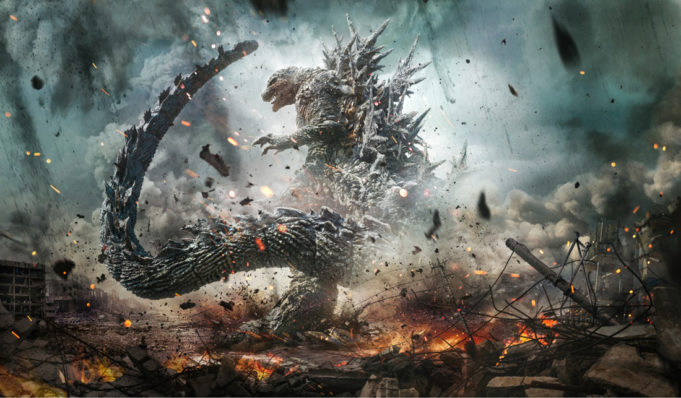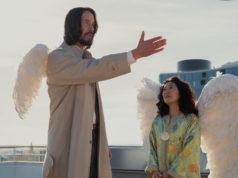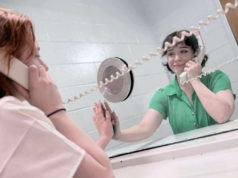Who’d have thought one of the year’s best movies would be a Godzilla film? Me, for one. I’ve been loving these things since before I could speak, and I know how well the stories they tell, the spectacle they show, and the titular monster can resonate with people and entertain them. But Godzilla Minus One goes deeper than perhaps any entry save the haunting original, not just settling for exciting monster action but going all in on a moving story that touches poignantly on both universal and distinctly Japanese themes.
This latest entry from Toho Studios — like their last, 2016’s Shin Godzilla — has no connection to the original 1954 Gojira. Minus One takes place even earlier, right after WWII. The country of Japan is slowly rebuilding and healing from wounds inflicted not just by the Allied military and the atomic bombings of Hiroshima and Nagasaki but by the sickening suicide-attacking mindset of its old militaristic government. A former kamikaze pilot returning to Tokyo, Koichi (Ryunosuke Kamiki) finds his home city devastated by firebombing, his parents dead, and all the neighbors blaming soldiers like him for failing to stop it all from happening. Wearing survivor’s guilt like a shroud, Koichi forms a found family with Noriko (Minami Hamabe) and the infant she’s caring for (Sae Nagatani), and he finds a dangerous job dismantling unexploded mines. However, it’s not just the war that haunts Koichi. Near the end of it, he landed on a remote island and encountered a creature that had risen up from the depths and slaughtered his fellow soldiers. A creature the locals called “Godzilla.” A creature that has since been mutated by nuclear bomb tests and is headed directly for Tokyo, ready to smash an already suffering country from a state of “zero” into the negative.
If that sounds more like a slice-of-life drama than a monster movie, it is, and it’s a great one. Director Takashi Yamazaki, who also handled the special effects on Shin Godzilla, is perhaps best known for directing the Always: Sunset on Third Street films, a series chronicling the lives of people on the titular street during Japan’s postwar boom (and whose second installation began with a dream sequence involving the Big G), so he’s at home handling period-piece dramas. And he makes the most of the setting with a simple yet involving story. Thanks to the characters’ relatable struggles and solid writing and acting, we care about their plight. Kamiki’s performance as Koichi anchors the movie, showing the shame and guilt he feels via slouched posture and slight glances, before nightmares of his early encounter with Godzilla send him into panic attacks. This also makes every victory he gains, from getting a steady job to making friends with the crew of the ship he’s on, that much more engaging. It seems as if he and others might be able to put the past behind them and heal.
And then Godzilla emerges. Beginning with a thrilling boat chase that evokes Jaws and moving toward his inevitable attack on Tokyo, the movie tightens a noose of tension around the audience’s throat. Nearly invulnerable and equipped with perhaps the most destructive version of his atomic breath yet, this is one of the scariest versions of the King of the Monsters ever shown. With no self-defense force to stop him and with the Americans absent keeping the Soviets at bay, what can a country full of barely-scraping-by, trauma-inflicted survivors like Koichi do in the face of a nuclear-powered living natural disaster?
What they can do amounts to one of the most moving and inspiring films of the year. As many former soldiers and other characters come out from under a military and government that viewed their lives as expendable, they learn to live again in the face of a monster that doesn’t just represent the horrors of nuclear war but also their shared trauma. With a musical score that both chokes you with dread and dares you to hope, accompanied by new renditions of Godzilla’s classic theme, you’ll find yourself gripping your seat and, maybe like me, holding your breath — and also maybe shedding a tear or two along the way.
Some might find the story bordering on melodrama, but other than that, about the only thing missing is some good ol’ fashioned giant-monster pugilism — fans can look forward to that in next year’s Godzilla x Kong: The New Empire. So, for everyone wanting a movie to make you deal with and feel deep themes, all alongside one of cinema’s greatest creations, you can’t ask for much more than Godzilla Minus One.
Godzilla Minus One
Starring Ryunosuke Kamiki, Minami Hamabe, Kuranosuke Sasaki, and Hidetaka Yoshioka. Written and directed by Takashi Yamazaki. Rated PG-13.












